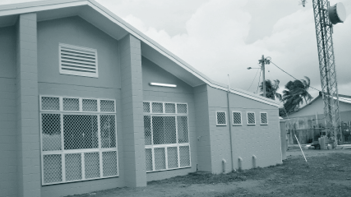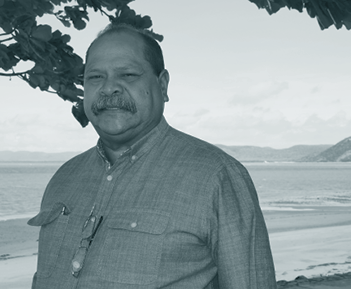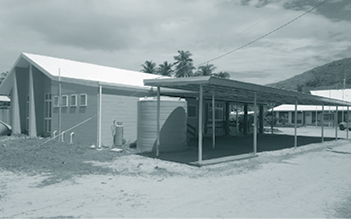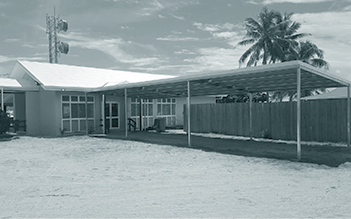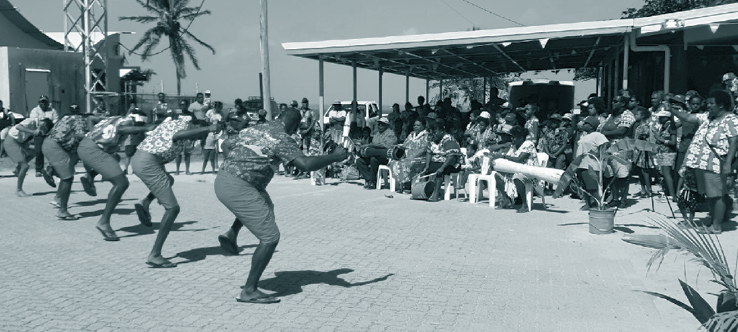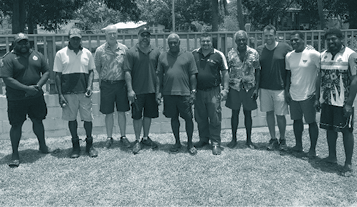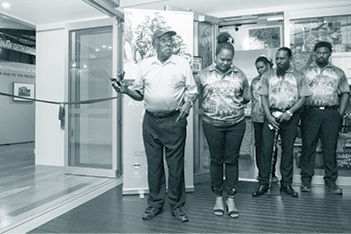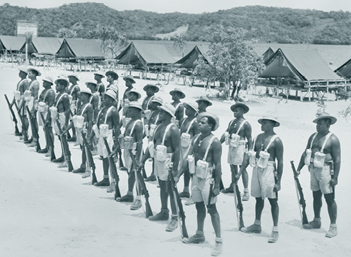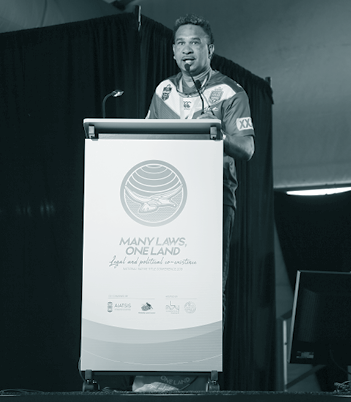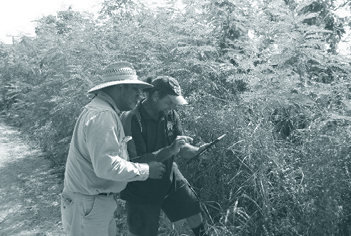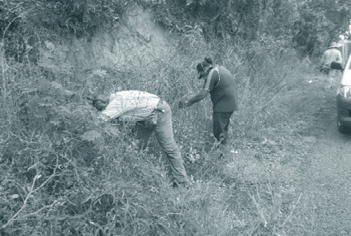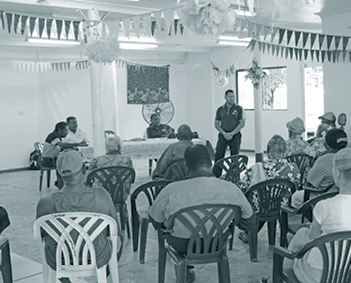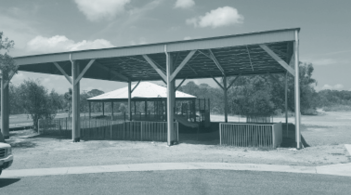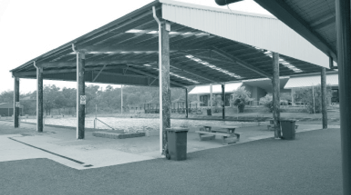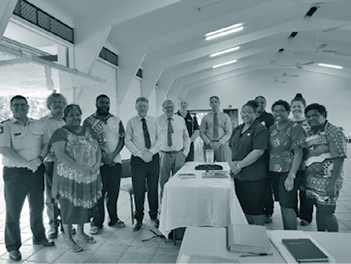Economic Development
Regional Goal
Enhance our region’s wealth by creating sustainable industries and increasing employment opportunities for our people equivalent to the wider Australian community.
Programme Outcomes
- Increased capability of Torres Strait Islander and Aboriginal people in the region to manage commercially viable businesses.
- Improved access to capital and other opportunities to finance commercially viable businesses.
- Increased number of commercially viable businesses owned and or operated by Torres Strait Islander and Aboriginal people in the region.
- Improved wealth of Torres Strait Islander and Aboriginal people in the region.
Projects and Initiatives
- Concessional home loans.
- Concessional business loans.
- Business training.
- Business support services.
Programme Expenditure 2017-2018
TABLE 2-15 : ECONOMIC DEVELOPMENT PROGRAMME EXPENDITURE, 2017-2018
| Budget $’000 |
Actual $’000 |
Variance $’000 |
|---|---|---|
| 10,073 | 10,079 | –6 |
Programme Performance
| Activity | Flag | Status |
|---|---|---|
| Business mentoring support | ● | Business mentoring support was approved for 11 clients in 2017-2018 to assist with organisational capacity building. The TSRA promoted the benefits of the business support standing panel to stakeholders throughout the year, resulting in an increase in the number of clients accessing the service. Nine business owners were supported to attend conferences for professional development and to build business networks. Three attended the eighth Indigenous Economic Development Forum and six attended the 2018 Supply Nation Connect knowledge forum and trade show. This represents a 10 per cent decrease in the number of clients supported when compared to 2016-2017. |
| Business funding support | ● | Five loan applications were approved. |
| Community Development Programme agreement management | ● | In July 2018, there were 889 Community Development Programme (CDP) job seekers. This represents a fall of 76 job seekers when compared to 2016-2017. During 2017-2018, 242 job seekers transitioned into paid employment. The regional employment target was met in each reporting period in 2017-2018. |
| Economic Development Investment Strategy | ● | The Torres Strait Regional Economic Investment Strategy (REIS) continued in 2017-2018. REIS supports three focal industries: Fisheries; Arts and Creative Industries; and Tourism. As part of REIS, the Arts and Creative Industries Business Growth Package was launched. The package provides a combination of low-interest business loans, professional business support and grant funding for eligible applicants. Four Fisheries Business Growth Package applications were received and two were approved in 2017-2018. Work on a Tourism Industries Business Growth Package is underway and the package will be launched in 2018. |
| Into Business Workshops | ● | Four series of Into Business Workshops were delivered (comprising workshops A, B and C); 113 participants attended the workshops and 26 participants completed the workshop series. The number of participants who attended workshops and the number who completed the workshop series were both higher than in 2016-2017. |
| Torres Strait Maritime Pathways Project | ● | The Torres Strait Maritime Pathways Project enhances the skills and capability of Torres Strait Islander and Aboriginal people (in the region) to operate commercial vessels and create maritime career pathways in related industries. In 2017-2018, participants undertook training as follows:
|
| Growing Our Own Tagai Transitions Maritime project | ● | The Growing Our Own Tagai Transitions Maritime project was delivered in partnership with the TSRA, Tagai State College, TAFE North Queensland, and the CDP provider, My Pathway. This project targets students in years 10, 11 and 12 at Tagai State College and builds their capability to utilise the region’s commercial maritime resources, and prepares school leavers for a smooth transition from school to work. In the first six months of 2017-2018:
Between 1 January 2018 and 30 June 2018, a new cohort of students commenced the Growing Our Own Tagai Transitions Maritime project. Six Year 10 students completed the Shipboard Safety Skill Set course and the Certificate I in Maritime Operations (General Purpose Hand). Fourteen Year 11 students completed the Shipboard Safety Skill Set course, started to accumulate sea time and completed task books for Certificate II in Maritime Operations (Coxswain Grade 1 Near Coastal) and Certificate II in Maritime Operations (Marine Engine Driver Grade 3 Near Coastal). Twelve Year 12 students completed the Short Range Operator Certificate of Proficiency, continued to accumulate sea time and commenced:
|
| Home Ownership Programme |

|
One home loan was approved in 2017-2018. Complex land tenure arrangements in the Torres Strait continue to make it difficult for loan applicants to provide appropriate security for loans in Deed of Grant in Trust and reserve communities. A funding agreement between the TSRA and Indigenous Business Australia (IBA) continues. Under the agreement the TSRA provides funds to IBA to write home loans for Torres Strait Islander and Aboriginal people living in the region. |
| Employment and training projects | ● | The TSRA works in partnership with My Pathway, local shires and PBCs to deliver employment and training projects in the region. These projects provide industry-specific training to CDP job seekers while also benefiting the wider community. Five projects were undertaken in 2017-2018, including:
St Pauls Community Hall and Kubin Community Hall In early 2017 there was an identified need on Moa Island to repair the existing Kubin Community Hall and complete the St Pauls Community Hall. To undertake these projects, the TSRA formed a partnership with the asset owner; the TSIRC; and My Pathway.A local Indigenous contractor was awarded the construction contract. Six job seekers gained employment: three in the construction industry and three as mentors. Ten CDP job seekers obtained a Certificate II in Construction Pathways as part of the project. The halls will be officially opened in August 2018. Mabuyag Community Hall The renovation of the Mabuyag Community Hall is the result of a partnership between the TSRA, the TSIRC and My Pathway.The Mabuyag Community Hall upgrade is complete and the hall was re-opened on 1 June 2018. Thursday Island Cycleway The Thursday Island Cycleway (Stage One) project is part of a multi-phased project led by the TSC. Project partners include the TSRA, the DTMR and My Pathway.Stage One involved provision of a 1.5-kilometre cycleway from the Thursday Island Secondary Campus zebra crossing to the Rose Hill boat ramp. The 10-month project was completed in June 2018. In total, 14 CDP job seekers trained on this project transitioned into paid employment in the construction industry. Nine CDP job seekers completed a Certificate III in Concreting. The TSRA has entered into a partnership with the TSC and the DTMR to fund Stage Two of the Thursday Island Cycleway as an opportunity for continued employment and as a training venue for CDP job seekers. Mentors employment project The TSRA funds mentors to provide specialised knowledge and cultural support to those participating in the employment and training projects.Future projects Plans are underway with partners for projects including:
|
| Tourism | ● | In 2017-2018, the TSRA funded an Events Coordinator position for the TSIRC, and continued to fund Events Coordinator positions for the TSC and the NPARC. The funding is provided for three years to allow for employment certainty and longer-term planning. In addition, the TSRA funded three multi-year Tourism Officer positions, one each for the TSC, TSIRC and NPARC, in 2017-2018. To develop stronger ties with Tourism Tropical North Queensland in the region, the TSRA has funded a Tourism Coordinator position. This position is dedicated solely to supporting the region’s efforts in enhancing the tourism/visitor economy for a two-year period. |
| Website redesign | ● | The Economic Development Programme area of the TSRA website has undergone further improvement to enhance the user experience. The website now includes additional online applications, up-to-date information from across government and the private sector, and a modified online product selector tool. |
Additional Programme Specific Performance Indicators
| Indicator | Flag | Status |
|---|---|---|
| An increase in the number of Torres Strait Islander and Aboriginal people in employment | ● | In 2017-2018, 242 CDP job seekers moved from welfare into employment. Of those, 196 job seekers met employment outcome milestones:
|
| Increase in the number of Torres Strait Islander and Aboriginal owned commercially viable businesses | ● | In 2017-2018, five business loans were approved to support Torres Strait Islander and Aboriginal owned businesses. In the same period, business mentoring and support were provided to 11 clients. Four Fisheries Business Growth Package applications were received and two were approved. |
| Increased availability of approved business training | ● | In 2017-2018, the TSRA continued to provide face-to-face business training through the delivery of Into Business Workshops. A total of 113 participants attended Into Business Workshops:
The attendance rate reflects an increase when compared to the previous year. |
| Legend | |||
|---|---|---|---|
| ○ | ● |

|
● |
| Not yet started | Completed/on schedule | Behind schedule less than three months | Behind schedule more than three months |
Case Study:
Mabuyag Island Community Hall Upgrade Project
The Mabuyag Community Hall upgrade project demonstrates the TSRA’s commitment to economic development and wealth creation in the region. The project provided Community Development Programme (CDP) job seekers with practical on-the-job development and training aligned to the needs of the local building industry.
Project partners
The renovation of the Mabuyag Community Hall was the result of a partnership between the TSRA, the Torres Strait Island Regional Council (TSIRC), and the CDP provider, My Pathway.
As the building’s owner, the TSIRC made a request to the TSRA to fund the upgrade of the Mabuyag Community Hall as a priority infrastructure project in early 2017, following a building report which rendered the hall unusable. In response, the TSRA invested over $305,000 from the Economic Development Programme to see it upgraded.
Before and after photos of the Mabuyag Community Hall
Outcomes for job seekers
The project provided important work experience, training and employment opportunities for local people in the region. Five CDP job seekers were employed as construction labourers and three as mentors. Ten CDP job seekers obtained a nationally recognised construction qualification that will assist them to find future employment in the construction industry.
Local Indigenous contractor Country Pride Construction was awarded the contract for the project. Mr Kevin Savage, Project Manager of Country Pride Construction, said that working in collaboration with the TSRA, TSIRC and My Pathway offered the opportunity to empower the community to find ways to do the work locally.
‘It was a great way to exchange knowledge, grow industry networks and build a community database to connect workers and employers in the region’, Mr Savage said.
Some highlights for the team were overcoming shame factors through mentoring and positive reinforcement, developing new construction skills, and achieving the high level of workmanship that was expected on the project.
Mr Kevin Savage, Project Manager, Country Pride Construction
‘At the start of the project it was a big learning curve for the job seekers’, Mr Savage said.
‘They all had their individual challenges to overcome, including family commitments, and it was rewarding to see them meet these challenges during the project and resolve some personal issues.
‘Together we have trained the CDP job seekers, so they have the skills and confidence to work in construction anywhere in Australia.’
Benefits for the community
The TSRA Chairperson, Mr Napau Pedro Stephen AM, said that the TSRA understands that the Mabuyag Community Hall is an essential structure in which local people can meet to hold community events and engage in Ailan Kastom.
‘The TSRA welcomed the request from Goemulgaw (Torres Strait Islanders) Corporation in October 2017 to also fund the cooking and dancing Zar Zars’, Mr Stephen said.
‘The project has reinvigorated an important asset for the Mabuyag Island community, whilst providing important workplace training and employment opportunities for local people.’
The re-opening of the Mabuyag Community Hall was celebrated in a joint event with the 10-year anniversary of the TSIRC amalgamation, on Friday, 1 June 2018.
To showcase the success of this project across the Torres Strait community and beyond, the TSRA engaged the video production services of locally owned music and film company One Blood Hidden Image Entertainment Group.
The dancing and cooking Zar Zars
The Kigu Dance Troop performing at the celebration of the hall’s re-opening
Fisheries
Regional Goal
Enhance our region’s wealth, by managing and maintaining sustainable fishing industries and increasing employment and economic opportunities for our people.
Programme Outcomes
- A commercially viable fishing industry which is 100 per cent owned by Torres Strait Islander and Aboriginal people.
- Improved wealth of Torres Strait Islander and Aboriginal people of the region.
- Sustainable management of fisheries resources.
Projects and Initiatives
- Engaging in the PZJA and supporting the engagement of Torres Strait Islander and Aboriginal people in PZJA decision-making.
- Providing opportunities to develop the capability and capacity of Torres Strait Islander and Aboriginal people to benefit from fisheries in the region.
- Assisting communities to engage in programme activities.
- Managing access to fisheries resources held in trust for Torres Strait Islander and Aboriginal people of the region.
Programme Expenditure 2017-2018
TABLE 2-16: FISHERIES PROGRAMME EXPENDITURE, 2017-2018
| Budget $’000 |
Actual $’000 |
Variance $’000 |
|---|---|---|
| 2,169 | 2,171 | –2 |
Programme External Funding Expenditure 2017-2018
TABLE 2-17: FISHERIES PROGRAMME EXTERNAL FUNDING EXPENDITURE, 2017-2018
| Budget $’000 |
Actual $’000 |
Variance $’000 |
|---|---|---|
| 3,750 | 2,800 | 950 |
Programme Performance
| Activity | Flag | Status |
|---|---|---|
| Fisheries communications | ● | In 2017-2018, the TSRA continued grant funding support for registered Torres Strait fishers’ associations to assist them to develop their capacity to represent the interests of fishers in their communities. Properly functioning associations can play a key role in providing effective communications on fisheries matters within communities. |
| Research and extension | ● | The Fisheries Programme’s research and extension projects support sustainability and commercial use of Torres Strait fisheries. Project initiatives undertaken in 2017-2018 were designed to implement the recommendations of the region’s finfish action plan. The plan is focused on helping people to overcome barriers to entry into commercial fishing and increase their participation in fisheries and fisheries-related commercial activities. In 2017-2018, the programme:
|
| Fisheries roadmap –towards 100 per cent ownership | ● | The TSRA has the lead on behalf of the PZJA for the development of the fisheries roadmap towards 100 per cent ownership of the commercial fisheries by Torres Strait Islander and Aboriginal Traditional Owners. In 2017-2018, the TSRA purchased one non-Indigenous fishing licence in the TRL fishery, increasing the provisional Traditional Inhabitant ownership to be allocated under a quota-based management plan to 66.17 per cent of the Australian share of the fishery. Currently, the TSRA owns 100 per cent of the finfish and bêche-de-mer fisheries on behalf of Traditional Inhabitants and does not have ownership of the prawn fishery. |
| Capacity building and training | ● | The Fisheries Programme delivers projects that increase the capacity of Torres Strait Islander and Aboriginal people in the region to participate in commercial fishing activities. In 2017-2018, the TSRA sponsored two participants who completed the National Seafood Industry Leadership Programme and another who commenced the programme. The TSRA created a Fisheries Cadetship and recruited a cadet in the Fisheries Programme, and supported seven participants in a three-day scientific workshop hosted by CSIRO in Brisbane. |
| Finfish quota management | ● | Each year since 2008 the TSRA has leased licences in the finfish fishery to non-Indigenous fishers. The aim of leasing licences to non-Indigenous fishers is to maintain markets until the Traditional Inhabitant Boat licence sector can increase its catch and meet market demand. The Fisheries Programme provides support to the TSRA Board and the Finfish Quota Management Committee to facilitate the leasing process. In 2017-2018, the committee recommended that licences for 110 tonnes of Spanish mackerel, 85 tonnes of coral trout and 17.5 tonnes of other species be leased out. Those leases generated $291,500 in revenue for Torres Strait communities. |
| Fisheries management framework | ● | In 2017-2018, the Fisheries Programme supported a delegation of TSRA and Malu Lamar Regional Native Title Body Corporate representatives to travel to New Zealand to investigate further the community management model for fisheries assets applied by Maori in New Zealand. The outcomes of the trip were presented to the TSRA Board, and a project steering committee was established to oversee the progression of a community management model for fisheries assets in the Torres Strait. The steering committee for this project includes the TSRA Chairperson, CEO, Portfolio Member for Fisheries and Member for Ugar, Member for Muralag and Ngurapai, and Member for Badu. The steering committee, with assistance from Terra Moana (New Zealand), visited all communities in the Torres Strait to seek the mandate from communities for the TSRA to progress the establishment of a single regional entity, independent of the TSRA, to hold and manage fisheries assets. These project activities are continuing. |
| PZJA representation | ● | In 2017-2018, the TSRA participated in and supported Traditional Inhabitant members’ participation in:
|
Additional Programme Specific Performance Indicators
| Indicator | Flag | Status |
|---|---|---|
| Increase in catches by Torres Strait Islander and Aboriginal fishers relative to total allowable catch |

|
The projects delivered by the TSRA Fisheries Programme are focused on increasing Torres Strait Islander and Aboriginal participation in commercial fishing activities. In 2017-2018, catch reporting by Torres Strait Islander and Aboriginal fishers in the Torres Strait was not mandatory and AFMA advised that there was no reliable data on catch reporting from this sector. On 1 December 2017, the PZJA implemented a fish receival licensing system in Torres Strait fisheries. While this will not capture information on the catch and effort in the fishery to inform scientific assessments, it will start to provide reliable data on the total catches of Torres Strait Islander and Aboriginal fishers in the region in the next reporting period. |
| Number of opportunities for Torres Strait Islander and Aboriginal people to increase their understanding and use of Torres Strait fisheries resources | ● | This indicator is being met through the programme’s research and extension and capacity-building and training projects. The TSRA continues to support the attendance and participation of up to five Traditional Inhabitant members in all PZJA consultative forums. The indicator is also being met through the TSRA’s sponsorship of:
|
| Legend | |||
|---|---|---|---|
| ○ | ● |

|
● |
|
Not yet started |
Completed/ on schedule |
Behind schedule less than three months | Behind schedule more than three months |
Case Study:
Fisheries Infrastructure and Services Audit Develops
Plan to Guide Future Funding
Successful commercial fishing enterprises in the Torres Strait rely on suitable infrastructure and services. However, a lack of on-shore infrastructure has been identified as a barrier to participation in the industry.
The TSRA Fisheries Programme works with Torres Strait Islander and Aboriginal fishers and communities to identify viable business opportunities that will contribute to the improved wealth of Indigenous people in the region, a sustainable fishing industry owned and operated by Indigenous people, and sustainable management of natural resources.
As the quality and range of fishing-related infrastructure and services varies significantly between Torres Strait communities, the Fisheries Programme identified the need for a regional audit to guide maintenance and development and to facilitate the successful operation and growth of fishing businesses.
An infrastructure and services audit was undertaken in 2017-2018 to guide priority investment at the island, cluster and regional levels. The aim of the audit was to identify gaps and develop a plan to guide future investment in and maintenance of fisheries-related infrastructure and services, to increase participation and employment in fishing and related services.
The audit task included identifying the current state of infrastructure and services, the community’s needs and aspirations for additional infrastructure and services that will contribute to the programme’s outcomes, and a plan to address any shortfalls.
Between August and November 2017, all Torres Strait communities were visited and community consultations were undertaken by an external consultant, with additional key stakeholder meetings held on Thursday Island and in Cairns.
The key issues identified by the audit covered fishing-related infrastructure and services in the Torres Strait; fishing activity and potential fisheries production; and analysis of the infrastructure and services in individual communities.
Recommendations of the audit included:
- establishing a single autonomous, independent body responsible for the ownership, management and governance of the fishery
- implementing prioritised community recommendations
- implementing small-scale maintenance and service facilities across outer island regions
- establishing an inner island marine precinct
- purchasing or leasing a primary fishing platform.
With the endorsement of the TSRA Board, a plan to guide the prioritisation of investment in infrastructure and services was produced and the Fisheries Programme secured $4.75 million in investment through the Indigenous Advancement Strategy to implement the outcomes of the audit.
Left to right: Karl Dai, William Stephen, Ewan Colquhoun, Kenny Bedford, Daniel Stephen, Jerry D Stephen Jr, Robert Modee, Shawn McAtamney, Rocky Stephen and Pau Stephen, at Ugar during the Fisheries Programme infrastructure and services audit
Culture, Art and Heritage
Regional Goal
Protect, promote, revitalise and maintain Torres Strait Islander and Aboriginal traditions and cultural heritage.
Programme Outcomes
- An active and sustainable arts and craft industry.
- Cultural values and protocols are integrated into service planning and management practice.
- The unique cultural heritage and histories of the region are preserved, maintained and promoted.
- Strong, supported and respected Ailan Kastom.
- The copyright, intellectual property and traditional knowledge of Torres Strait Islander and Aboriginal people in the region are protected.
Projects and Initiatives
- Cultural maintenance and observance.
- Arts industry development.
- Gateway/hub for presenting, preserving, promoting and providing education on Torres Strait Islander and Aboriginal culture and arts.
- Cultural heritage management (with links to the Environmental Management Programme).
- Copyright and intellectual property rights.
- Cultural values and protocols.
Programme Expenditure 2017-2018
TABLE 2-18: CULTURE, ART AND HERITAGE PROGRAMME EXPENDITURE, 2017-2018
| Budget $’000 |
Actual $’000 |
Variance $’000 |
|---|---|---|
| 4,221 | 4,247 | –26 |
Programme External Funding Expenditure 2017-2018
TABLE 2-19: CULTURE, ART AND HERITAGE PROGRAMME EXTERNAL FUNDING EXPENDITURE, 2017-2018
| Budget $’000 |
Actual $’000 |
Variance $’000 |
|---|---|---|
| 490 | 490 | – |
Programme Performance
| Activity | Flag | Status |
|---|---|---|
| Arts development programme | ● | The TSRA continued to deliver arts development initiatives throughout the region in 2017-2018, including by providing operational and skills development support to the three regional art centres on Badu, Erub and Moa. The TSRA hosted the annual Torres Strait Artist Forum on Thursday Island, providing 22 local emerging artists with information presented by industry specialists, including Supply Nation, the Indigenous Art Code, the Flying Arts Alliance, the Copyright Agency, UMI Arts and the Gab Titui Cultural Centre (GTCC). In partnership with the Flying Arts Alliance, the TSRA engaged local artists in skills development workshops on textile and printable wear in the Northern Peninsula Area, traditional and contemporary weaving in Kubin, and batik on Thursday Island. |
| Culture, art and heritage grants | ● | The TSRA Culture, Art and Heritage Programme supported a total of 24 grant applications in 2017-2018, contributing towards the promotion and maintenance of Torres Strait Islander and Aboriginal art and culture in the region. Funded activities included skills development projects for artists and schools, traditional and contemporary music production and performing arts participation at events for individuals and groups, and language and cultural maintenance initiatives. The programme also contributed to regionally significant events including Mabo Day and the 75th anniversary of the formation of the Torres Strait Light Infantry Battalion. |
| Cultural maintenance programme | ● | The TSRA acknowledges and respectfully observes and practises the region’s cultural protocols and Ailan Kastom through its programmes and initiatives delivered in communities. The TSRA continues to provide guidance on cultural protocols to Australian Government and Queensland Government departments and non-government stakeholders visiting the region. Throughout 2017-2018, the TSRA supported initiatives on cultural maintenance, including by providing grant funding for participation by traditional music and dance groups at cultural events, and activities promoting and preserving cultural knowledge and traditions, such as publications and music productions. The GTCC actively promotes cultural maintenance through exhibitions displayed in the Ephraim Bani Gallery. In 2017-2018, the exhibitions programme featured the Gab Titui Collection and the 75th Anniversary of the Torres Strait Light Infantry Battalion exhibition. |
| Dance strategy | ● | The TSRA continued to support and promote region-based traditional dance teams in 2017-2018, through opportunities such as the grant rounds, TSRA events and the TSRA Dance Strategy. Events considered for the TSRA Dance Strategy were, collectively, the 2018 Darwin Aboriginal Art Fair, Darwin Festival, Cairns Indigenous Art Fair and the Telstra National Aboriginal and Torres Strait Islander Art Awards. The successful dance teams were the Meriam dance team based on Thursday Island, Eip Karem Beizam, and Seisia Kayin Thithuyil. |
| Arts licensing and IP protection | ● | In 2017-2018, the GTCC engaged 25 artists under licence agreements for the use of their artwork images in publications and on art and craft products and merchandise developed by the centre, such as mugs, ties, magnets and the GTCC calendar. |
| Gab Titui Indigenous Art Award | ● | The 2017 Gab Titui Indigenous Art Award received 52 entries and attracted 300 people on opening night and more than 3,000 visitors over six weeks. The art award is a flagship event for the GTCC and TSRA and draws in members of the local community, leaders, curators, representatives of collection institutions and tourists, who visit Thursday Island specifically for this exhibition. |
| Gab Titui Cultural Centre – exhibitions/public programmes | ● | Exhibitions The GTCC exhibitions programme partnered with some of Australia’s leading galleries and museums to bring Torres Strait culture and arts to a wider audience nationally and internationally. The GTCC supported the National Gallery of Victoria and Cairns Art Gallery in the development of the Lei it On exhibition, which opened at the Cairns Art Gallery in July 2017.In partnership with the National Museum of Australia, the Evolution: Torres Strait Masks exhibition has embarked on its national tour and opened at the Museum of Tropical Queensland. The exhibition will tour to Melbourne and several galleries and museums in Western Australia during 2018-2019. Evolution: Torres Strait Masks also opened as a graphic panel display at the Vietnam Museum of Ethnology, as part of activities celebrating the 45th anniversary of diplomatic relations between Australia and Vietnam. Public Programmes The GTCC offered a range of public programmes for visitors of all ages. The events were opportunities for active engagement with the community, external stakeholders and skilled Torres Strait artists and cultural practitioners. The public programme activities reflected the diversity of the communities and art forms throughout the Torres Strait. The activities either incorporated GTCC exhibitions or were themed around regional, national and international Indigenous commemorative occasions.The 2017-2018 public programmes schedule of events included a seniors’ scrapbooking workshop with Home and Community Care Elders, a week-long workshop upskilling artists with the nationally acclaimed Indigenous Jewellery Project, an advanced lino-printing workshop conducted by master printer Theo Tremblay, themed school holiday programmes, community visits, and regular beading and weaving workshops. |
| The Torres Strait language strategy | ● | In 2017-2018, the TSRA, in partnership with stakeholders, delivered initiatives in the Torres Strait Traditional Languages Plan 2016-2019 and Languages Charter, including an audit of traditional language speakers and the development of a languages website and an implementation plan to operate the Regional Language Centre. The Torres Strait Traditional Language Advisory Committee, established in 2016-2017 to guide the implementation of the plan, participated in a number of activities in communities and at state and national forums – such as the Puliima National Indigenous Language and Technology Forum in Cairns, the National Indigenous Languages Convention on the Gold Coast, and the Queensland Aboriginal and Torres Strait Islander Languages Forum in Rockhampton – to promote the maintenance of the traditional languages of Meriam Mir and Kala Lagaw Ya, and their respective dialects. The TSRA is working closely with Tagai State College, and other stakeholders, to implement the Regional Language Centre operations and further delivery of language maintenance activities in communities. |
| Music strategy – Music and Dance Audit |

|
The TSRA’s Music and Dance Audit works with the region’s communities to record and preserve traditional music, dance and cultural knowledge, compiling recordings into CD and DVD packages that are distributed to communities and archive institutions and promoted through the GTCC. In 2017-2018, the TSRA and partners worked with three communities to complete their CD and DVD productions, and commenced planning for activities in the remaining two communities. |
| Legend | |||
|---|---|---|---|
| ○ | ● |

|
● |
|
Not yet started |
Completed/ on schedule |
Behind schedule less than three months | Behind schedule more than three months |
Case Study:
Exhibitions Celebrate First Australians’ Wartime Contributions
In March 2018, the TSRA Gab Titui Cultural Centre celebrated the 75th anniversary of the formation of the Torres Strait Light Infantry Battalion by presenting two exhibitions to commemorate the occasion.
The Torres Strait Light Infantry Battalion was formed in 1943, as over 800 Torres Strait Islanders – almost the entire male population of the Torres Strait – joined together as one against the threat of invasion from the north.
The historical contributions of Torres Strait Islander and Aboriginal people to Australia’s armed forces were formidable but are often overlooked.
The 75th Anniversary of the Torres Strait Light Infantry Battalion exhibition, curated by the Gab Titui Cultural Centre, was supported by the award-winning Shrine of Remembrance travelling exhibition, Indigenous Australians at war from the Boer War to the present.
Both exhibitions celebrated and uncovered the individual and family stories of service and sacrifice of the First Australians and acknowledged a significant part of the region’s history.
Torres Strait Light Infantry Battalion veteran Mr Mebai Wasusum cutting the ribbon for the 75th Anniversary of the Torres Strait Light Infantry Battalion exhibition
A squad of the Torres Strait Light Infantry Battalion training on Thursday Island in 1945
Soldiers of the Torres Strait Light Infantry Battalion C Company
Native Title
Regional Goal
Protect, maintain and progress Native Title rights and recognition over the region’s land and sea country.
Programme Outcomes
- Changes to Native Title and Fisheries legislation which recognise the commercial rights as part of the Native Title rights of Traditional Owners under the Torres Strait Sea Claim Part A determination.
- Successfully negotiated Future Acts and ILUAs.
- Native Title claims are successfully determined.
- PBCs understand and meet their responsibilities under the Native Title Act 1993 (Cth).
Projects and Initiatives
- Progress and successfully negotiate ILUAs.
- Progress and successfully negotiate Native Title Claims.
- Perform the functions of an NTRB under the Native Title Act.
- Develop proposals regarding legislation that impacts on Native Title.
- Build the capacity of Registered Native Title Bodies Corporate.
Programme Expenditure 2017-2018
TABLE 2-20: NATIVE TITLE PROGRAMME EXPENDITURE, 2017-2018
| Budget $’000 |
Actual $’000 |
Variance $’000 |
|---|---|---|
| 5,556 | 5,559 | –3 |
Programme External Funding Expenditure 2017-2018
TABLE 2-21: NATIVE TITLE PROGRAMME EXTERNAL FUNDING EXPENDITURE, 2017-2018
| Budget $’000 |
Actual $’000 |
Variance $’000 |
|---|---|---|
| – | 196 | –196 |
Programme Performance
| Activity | Flag | Status |
|---|---|---|
| Native Title compensation | ● | In 2017-2018, 13 ILUAs were successfully negotiated. The value of compensation for the agreements is approximately $1.465 million. Since 2005, 78 ILUAs have been registered. The value of compensation is approximately $3.881 million. |
| Deed of Grant in Trust (DOGIT) transfer | ○ | There were no DOGIT transfers in 2017-2018. The transfer of DOGITs on four islands is currently under consideration by the Traditional Owners. |
| Land Holding Act (Katter Leases) | ● | There are 330 Katter lease entitlements in the region. The TSRA worked with the Queensland Government and the TSIRC and finalised Katter leases on Badu Island. This ILUA has been completed and awaits registration. A recent Supreme Court decision has clarified that the grant of such leases would ordinarily extinguish Native Title. This poses significant challenges to Native Title in the region. |
| Major Infrastructure ILUA | ● | The Native Title Office has worked with the Queensland Government and the TSIRC and the parties have finalised the Major Infrastructure ILUA. |
| Management of Future Acts and ILUAs | ● | The Native Title Office received 260 Future Acts notices in 2017-2018. Responses have been provided to 258 of those notices. |
| Native Title claim Sea Claim Part B (QUD6040/2001) |
● | The NTRB has been assisting and facilitating the representation of the applicant and Indigenous respondents to this claim. The Part B area is wholly overlapped by two claims. The western area of the claim is overlapped by a claim filed on behalf of the Kaurareg people and the eastern area is overlapped by a claim filed on behalf of the North Eastern people of Cape York. The Badulgal, Mualgal and Kaurareg people have agreed that the western overlap is shared sea country. The TSRA is party to consent orders setting out the process for re-authorising the claim in 2018. Negotiations with the Cape York Land Council about resolving the eastern overlap have commenced. Further anthropological research is required to identify the Traditional Owner group for the claim. |
| Native Title Conference | ● | The National Native Title Conference was held from 5 to 7 June 2018 in Broome. Native Title holders from the Torres Strait gave presentations and participated in a number of important sessions on Native Title developments in the region. |
| NTRB legal services | ● | The Native Title Office provides a wide range of legal assistance to the PBCs and Traditional Owners in the region upon request. Table 2-22 provides statistical information on the level of engagement in 2017-2018. |
| PBC support and capacity building | ● | The Native Title Office provides support to 21 PBCs in the region to ensure that they maintain legislative compliance and can effectively engage with the Traditional Owners in their communities. In 2017-2018, an MOU was signed between the TSRA and the Office of the Registrar of Indigenous Corporations (ORIC). Under the MOU, an ORIC officer was based in the main office of the TSRA to assist in PBC capacity building and to carry out Rule Book Workshops throughout the region. |
Additional Programme Specific Performance Indicators
| Indicator | Flag | Status |
|---|---|---|
| Number of reported non-compliance matters involving PBCs | ● | There are no reported non-compliance matters for the region. |
| Number of DOGITs transferred to PBCs with appropriate support mechanisms | ○ | There were no DOGIT transfers in 2017-2018. |
| Legend | ○ | ● |

|
● |
|---|---|---|---|
|
Not yet started |
Completed/ on schedule |
Behind schedule less than three months | Behind schedule more than three months |
Statistical Data
Table 2-22: Native Title Office Performance Statistics
| Facilitation and assistance | Number |
|---|---|
| 1. THE CLAIMS EXPERIENCE | |
| Claimant applications | |
| Active claims represented at 30 June 2017 | 2 |
| Plus claims filed this year by Native Title Representative Body | 0 |
| Less claims determined 2017-2018 | 0 |
| Less claims dismissed 2017-2018 | 0 |
| Less claims withdrawn 2017-2018 | 0 |
| (+ or -) Other disposition | 0 |
| Active claims represented at 30 June 2018 | 2 |
| Number of active claims registered by National Native Title Tribunal | 0 |
| Claims in development | 1 |
| Non-claimant applications | 0 |
| Compensation claims | 0 |
| 2. THE AGREEMENTS EXPERIENCE | |
| Future Acts notices received | 260 |
| Responses to Future Acts notices | 258 |
| Agreements concluded | 0 |
| Agreements in development | 0 |
| Indigenous Land Use Agreements concluded and registered | 8 |
| Indigenous Land Use Agreements in development | 20 |
| Complaints and disputes | |
| Complaints | |
| Received | 0 |
| Resolved | 0 |
| Pending | 0 |
| Disputes relating to Native Title applications | 1 |
| Disputes relating to ILUAs, rights of access and other matters | 5 |
| Requests for review of decisions not to assist | |
| Requests received | 1 |
| Reviews completed | 1 |
| Requests for review of decisions to assist | |
| Requests received | 15 |
| Requests approved | 15 |
Case Study:
National Native Title Conference – Many Laws, One Land
The 2018 National Native Title Conference – Many Laws, One Land: legal and political co-existence – was held in Broome, Western Australia, from 5 to 7 June.
The conference was convened by the Australian Institute of Aboriginal and Torres Strait Islander Studies and the Kimberley Land Council. It was hosted by the Yawuru people on their traditional lands.
Mr Napau Pedro Stephen AM, TSRA Chairperson, and Mr Eric Peter, TSRA Member for Boigu and Portfolio Member for Native Title, attended the conference, along with the TSRA’s Principal Legal Officer and Senior Legal Officer and a number of the Chairs of Prescribed Bodies Corporate (PBCs) in the Torres Strait region.
As the conference marked 25 years since the passing of the Native Title Act 1993 (Cth), participants discussed the challenges and opportunities of Native Title in the context of Aboriginal and Torres Strait Islander people’s aspirations for their lands, waters and communities.
Native Title developments in the Torres Strait were discussed in a session entitled ‘Dispute resolution in the Torres Strait: How we combined the two laws and practices’. The speakers were Mr Ned David, Chair of Magani Lagaugal (Torres Strait Islanders) Corporation Registered Native Title Body Corporate (RNTBC); Mr Keith Pabai, Chair of Malu Ki’ai (Torres Strait Islanders) Corporation RNTBC; and Ms Cassie Lang, formerly of the TSRA Native Title Office and now a senior solicitor with Marrawah Law.
Between 2014 and 2017, the Queensland Government (through the Department of Aboriginal and Torres Strait Islander Partnerships) negotiated Indigenous Land Use Agreements throughout the Torres Strait for land to construct social houses. The RNTBCs were required by Native Title regulations to comply with consultation and consent requirements; however, disputes often arose between Traditional Owners about who had authority to speak for the land.
Mr Eric Peter, TSRA Member for Boigu and Portfolio Member for Native Title, addressing the 2018 National Native Title Conference in Broome
Mr David explained how the Magani Lagaugal (Torres Strait Islanders) Corporation (the PBC for Iama) resolved those disputes, using their traditional laws and customs and in accordance with their rule book, by establishing a dispute resolution council. Representatives were selected based on criteria developed by the community.
Mr Pabai explained how the Malu Ki’ai (Torres Strait Islanders) Corporation (the PBC for Boigu) and the Boigu community resolved disputes by drawing their traditional boundaries and colour-coding their totem groups, then mapping them with assistance from the National Native Title Tribunal and the TSRA Native Title Office.
Environmental Management
Regional Goal
Our natural and cultural environment is an asset that is protected, preserved and enjoyed through sustainable management.
Programme Outcomes
- Strengthened sustainable use, protection and management of natural and cultural resources.
- Improved community adaptation to climate change impacts, including sea level rise.
- Increased uptake of renewable energy for Torres Strait.
- Support community sustainable horticulture.
Projects and Initiatives
Land:
- Biodiversity planning and management
- Invasive species
- Sustainable horticulture
- Environmental education.
Sea:
- Turtle and dugong planning and management
- Marine biodiversity
- Water quality
- State of the environment report card.
People:
- Ranger project
- Indigenous Protected Areas project
- Traditional ecological knowledge project
- Traditional owner engagement
- Compliance project.
Coasts and climate:
- Climate change adaptation and resilience
- Renewable energy.
Programme Expenditure 2017-2018
TABLE 2-23: ENVIRONMENTAL MANAGEMENT PROGRAMME EXPENDITURE, 2017-2018
| Budget $’000 |
Actual $’000 |
Variance $’000 |
|---|---|---|
| 5,054 | 4,606 | 448 |
Programme External Funding Expenditure 2017-2018
TABLE 2-24: ENVIRONMENTAL MANAGEMENT PROGRAMME EXTERNAL FUNDING EXPENDITURE, 2017-2018
| Budget $’000 |
Actual $’000 |
Variance $’000 |
|---|---|---|
| 12,944 | 10,592 | 2,352 |
Programme Performance
| Activity | Flag | Status |
|---|---|---|
| Invasive species management | ● | The TSRA coordinated the development of the Torres Strait Regional Biosecurity Plan 2018-2023. Queensland Government funding was secured for a four-year project to manage feral animals and weeds on key islands across the region through a partnership approach with local government. Major weed programmes are underway to control leucaena, lantana and rubber bush on several islands, including Moa, Boigu, Saibai, Mer, Erub, Warraber and Dauan. Invasive feral cat and rodent surveys have been conducted on 13 uninhabited islands in the Torres Strait. Aerial surveys have been conducted for wild horses and deer on three islands. The TSC has been contracted to conduct wild dog, feral cat and cane toad control programmes on Thursday Island and Horn Island. The TSRA also entered a partnership agreement for shared service delivery with the Australian Government Department of Agriculture and Water Resources for the provision of biosecurity services, which has created fee-for-service opportunities for TSRA rangers. The TSRA also participates in the Torres Strait and Northern Peninsula Area Biosecurity Working Group. |
| Sustainable horticulture project | ● | The Environmental Management Programme works closely with the TSRA’s Healthy Communities and Safe Communities programmes to support communities with horticulture activities in the region. A Regional Landcare Facilitator is employed to coordinate project activities, including facilitation of workshops on outer islands to provide practical and technical demonstrations on food gardening, to assist with the re-establishment of family garden plots and backyard gardens as well as the development and maintenance of plant nurseries. The Regional Landcare Facilitator provides a quarterly garden column in the Torres News, and supports the Thursday Island Garden Fair with a stall promoting traditional food gardening and sustainable practices. |
| Ranger project | ● | The TSRA employs 45 rangers, as well as support staff, across 13 outer island communities. Working on Country plans that were developed with Traditional Owners are in place to guide the local cultural and natural resource management activities of rangers, who participate in a comprehensive training programme to equip them for their scope of works. A large part of the ranger programme is based on maritime operations and the programme operates nine vessels located across the region. Future prospects include roles in intelligence gathering and compliance activities. |
| Environmental education project | ● | This project supports the employment of an Environmental Education Coordinator to lead and coordinate the development and delivery of environmental education programmes within Tagai State College campuses. A school camp base has been established at Bamaga to support traditional knowledge transfer through teaching arts, crafts, cooking, dancing and hunting. Each school has received assistance and equipment to update and maintain school gardens. |
| Dugong and turtle management | ● | Dugong and turtle management plans are in place for each of the 14 outer island communities and are being implemented by the communities with the support of the TSRA. The plans integrate traditional use and contemporary science and management approaches to support the sustainable management of dugong and turtle across the region. Each plan is currently undergoing review to bring more strength to traditional ways of governing the cultural protocols and management arrangements for the use of dugong and turtle resources. A dugong and turtle management plan and permit system for the Kaiwalagal region has been development by Kaurareg Traditional Owners with support from the TSRA. Kaurareg Traditional Owners are now working towards endorsing the plan and determining how it can be implemented. The TSRA Environmental Management Programme continues to lead annual turtle nesting and hatchling surveys at the index rookery for green turtles in the Torres Strait, and is undertaking survey and monitoring work for other species that nest and forage in the region. |
| Biodiversity planning and management | ● | Baseline biodiversity surveys have been carried out on 13 inhabited islands and more than 20 uninhabited islands. A plant and animal book and video have been produced for Badu. Mangrove and water quality monitoring projects have been undertaken on Boigu and Saibai. Seasonal calendars are under development for two islands. |
| Marine ecosystem monitoring | ● | Rangers have been trained in seagrass monitoring techniques and are actively carrying out intertidal monitoring in seven communities. Coral surveys and assessments of the extent of coral bleaching have been undertaken. The TSRA continued to support rangers to conduct biannual surveys of coral reefs. Remote weather stations at four locations across the region continued to be maintained and collect weather and marine data. Research is underway to investigate the impacts of Fly River pollution on the marine resources of Torres Strait. The TSRA also participated in a recent shipping forum to consider the impacts of shipping in the region and risk mitigation options. |
| Indigenous Protected Areas (IPAs) project | ● | Three IPAs have been declared and are being actively managed in the Torres Strait region: Ugul Malu Kawal IPA (previously Warul Kawa IPA), Pulu Islet IPA and Warraberalgal Porumalgal IPA. The TSRA, including rangers from associated communities, continues to actively support the implementation of management plans for all IPAs in the region. Following extensive consultation, a review of the IPA plan of management for Ugul Malu Kawal has been completed. A review of the Warraberalgal Porumalgal IPA plan of management is underway. |
| Traditional ecological knowledge (TEK) project | ● | The TEK project supports participating Torres Strait communities to utilise a TEK database for the collection, protection and controlled sharing of cultural and natural resource information while ensuring adherence to cultural protocols. The project was expanded during 2017-2018, to include the communities of Saibai and Poruma, and now encompasses 11 Torres Strait communities. A review of the TEK project was undertaken in early 2016 to explore how to increase the uptake of the TEK system, how to better incorporate TEK into land and sea management, and how to best utilise project resources. Of the 44 recommendations from the review, 87 per cent have been implemented or are underway. |
| Future funding and investment prospectus | ● | The Land and Sea Management Strategy for Torres Strait 2016-2036 was launched in August 2016. The strategy is the guiding framework for environmental management in the region, through a collaborative approach with Traditional Owners, all levels of government and other partners. An investment prospectus is under development to support the TSRA’s efforts to secure ongoing funding, and to guide and inform future management, monitoring and evaluation of the region’s key values. |
| Climate change adaptation and resilience | ● | Implementation of the Torres Strait Regional Adaptation and Resilience Plan 2016-2021 continues across a range of focus areas, including fisheries, health, disaster risk reduction, coastal adaptation and marine and terrestrial environments. The Torres Strait Regional Coordination Group was established to drive high-level regional coordination of critical adaptation and resilience actions across programmes and departments. The Masig Resilience Pilot has made good progress with the establishment of a local resilience committee. |
| Renewable energy | ● | A solar array and energy-efficient pump have been installed at the Masig desalination plant to reduce the cost of water production. A 5-kilowatt solar array with battery back-up has been installed at the guesthouse on Mer. Three small-scale biogas digesters are being trialled to convert green waste to energy. A draft proposal has been developed for a comprehensive integrated waste and energy solution for Horn Island and Thursday Island. |
Additional Programme Specific Performance Indicators
| Indicator | Flag | Status |
|---|---|---|
| Number of actions in the climate change strategy and associated action plans implemented | ● | 26 actions from the regional adaptation plan are now being progressed. |
| At least two new renewable energy initiatives commenced by 2018 | ● | Two renewable energy initiatives commenced in the reporting period. |
| Number of inhabited islands with active food producing community gardens in place | ● | Across the region, three community gardens have been revitalised and are now recognised as celebration gardens. The Horn Island garden has been totally revitalised and expanded, the St Pauls community garden has received a new fence to protect it from horse damage, and the Warraber community garden has received assistance for a hydroponic vegetable-growing project. Discussions have started on revitalising the Hammond Island community garden. |
| Legend | |||
|---|---|---|---|
| ○ | ● |

|
● |
|
Not yet started |
Completed/ on schedule |
Behind schedule less than three months | Behind schedule more than three months |
Case Study:
Meeting the Challenge of Biosecurity – Weed Management
on the Inner Islands of the Torres Strait
The TSRA currently works with communities on the 14 inhabited outer islands of the Torres Strait to carry out invasive plant mapping and weed control, which are core functions of the Indigenous rangers on each island. One of the main focus points and gaps in regional weed control and mapping relates to the resources and capacity to carry out those functions on the inner islands, where they are not a responsibility of the TSRA.
The TSRA and inner island stakeholders – the Torres Shire Council (TSC) and the Torres Strait Island Regional Council (TSIRC) – are taking a collaborative approach to look at options to increase skills and knowledge and build the capacity of stakeholder employees to take on a more active role in the field of weed management.
TSC and TSIRC staff mapping leucaena
TSC and TSIRC staff removing juvenile weeds
Capacity building
This project will provide training for local employees, to give them capacity to conduct weed mapping, using new technology, and to apply effective control techniques for priority weed species. The training will be aligned with the soon to be released Torres Strait Regional Biosecurity Plan 2018-2023 and associated Torres Strait Regional Biosecurity Action Plans.
In May 2018, the TSRA facilitated a four-day workshop on Thursday Island with key field staff of the TSC and TSIRC. Training was conducted in weed baseline mapping using the Fulcrum App, and within 1.5 days staff had successfully mapped the extent of leucaena on Thursday Island. Staff also undertook training on control of leucaena using the cut stump and spray technique. Staff discussed safety-related issues and ran through safe work procedures for chainsaw use and chemical spraying.
TSRA Senior Natural Resource Management Officers will provide ongoing technical support for the staff who were involved in the training, and their managers.
Weed management on the inner islands is vital, not only for those islands, but also to help to minimise the risk of exotic weed species being translocated to other islands where they currently do not exist.
Weed mapping
The weed baseline mapping software gave the TSC and TSIRC employees a better understanding of the leucaena infestations and generated baseline data on the weed situation as of May 2018. The baseline data can now be used to measure the progress of any future management of leucaena, and help to guide future management objectives and activities. A total of 277 separate leucaena infestations were recorded. The mapping software and visual display that the maps represent have given the employees an eagerness to continue using this software for other priority species.
There appears to be no evidence that significant baseline weed mapping has previously occurred on the inner islands of the Torres Strait. Certain isolated species of extreme priority may have been recorded and mapped by the Northern Australia Quarantine Strategy, but full-scale, island-wide weed mapping has yet to occur. The activities in this project were the first step to initiate a drive for inner island weed mapping and systematic weed management by local authorities.
Benefits for the region
The inner islands are a hub of activity and are frequently visited by vessels travelling to and from outer islands and the mainland. Weed management on the inner islands is vital, not only for those islands, but also to help to minimise the risk of exotic weed species being translocated to other islands where they currently do not exist.
Many important outcomes have resulted from this project and the collaborative approach has launched the process of developing skills and introducing new technology to the TSC and TSIRC to make weed management easier.
Governance and Leadership
Regional Goal
Effective and transparent self-government, with strong leadership.
Programme Outcomes
- Implementation of the National Indigenous Reform Agreement service delivery principles.
- Appropriate Torres Strait Islander and Aboriginal participation in decision-making.
- Improved communication, cultural competence and service delivery within a community development framework across governments.
- Strong Torres Strait Islander and Aboriginal organisational leadership and governance.
Projects and Initiatives
- Governance capacity building.
- Leadership capacity building.
- Integrated Service Delivery coordination.
- Community engagement.
- Women’s leadership programme.
- Youth leadership programme.
- Tertiary education assistance.
- Regional broadcasting support.
Programme Expenditure 2017-2018
TABLE 2-25: GOVERNANCE AND LEADERSHIP PROGRAMME EXPENDITURE, 2017-2018
| Budget $’000 |
Actual $’000 |
Variance $’000 |
|---|---|---|
| 5,315 | 5,318 | –3 |
Programme Performance
| Activity | Flag | Status |
|---|---|---|
| Community consultation and engagement |

|
During 2017-2018, community engagement was conducted in five Torres Strait communities by the Chairperson and the CEO. Further community visits are planned. |
| Integrated Service Delivery community booklets | ● | The community booklet for TRAWQ (the communities of Tamwoy, Rose Hill, Aplin, Waiben and Quarantine on Thursday Island) was workshopped and updated. |
| Media and communications support | ● | This is a contracted activity through Zakazukha Marketing Communications. In 2017-2018, 65 media releases were produced. |
| Internal and external audit support | ● | The external and internal audit programmes were completed. Audit recommendation tracking and status reports were provided at four Audit Committee meetings. |
| Assistance with Tertiary Education Scheme | ● | Sixteen tertiary scholarships were offered in 2017-2018. |
| Board and Chairperson support | ● | Four Executive Committee meetings, four Audit Committee meetings and four Board meetings were conducted in 2016-2017. Executive assistance was provided to the TSRA Chairperson. |
| Board Strategic Workshop | ● | All Board members attended the TSRA’s Board Strategic Training Workshop in March 2018. The focus of the workshop and training was to discuss the TSRA’s financial, strategic planning and risk framework. |
| Indigenous leadership | ● | During 2017-2018, one person was supported to undertake the Australian Rural Leadership Program and one person was supported to undertake the Training Rural Australians in Leadership programme. |
| Support to regional broadcasting | ● | The Torres Strait Islanders Media Association met its broadcasting hours and local content targets. A review was undertaken during 2017-2018. |
| Women’s and youth leadership | ● | Seven participants were supported in the Torres Strait Young Leaders Program and 10 women were supported to undertake the Torres Strait Women’s Leadership Program. |
Additional Programme Specific Performance Indicators
| Indicator | Flag | Status |
|---|---|---|
| Achieve a minimum of 20 per cent increase in access to services over the life of the Torres Strait Development Plan 2014-2018 measured from the 2012 baseline regional plan community booklets | ● | The Torres Strait and Northern Peninsula Area Regional Plan 2009-2029 identified 1,608 service gaps.1
In 2012-2013, 372 (23 per cent) had been fully addressed. This increased to 773 (48 per cent) in 2013-2014 and 1,034 (64 per cent) in 2014-2015. In 2015-2016, new issues were identified from the refresh of 13 community booklets. The issues that have been fully addressed remain at 1,034 (64 per cent). |
| Increase in Torres Strait Islander and Aboriginal women with the capacity to participate in leadership roles in the region measured from the 2012 baseline | ● | The Torres Strait Women’s Leadership Program is delivered in partnership with the Australian Rural Leadership Foundation. The 2012 baseline was six participants. Since then, the following participants have been supported:
|
| Increase in Torres Strait Islander and Aboriginal youth (18-25) with the capacity to participate in leadership development activities measured from the 2012 baseline | ● | Training Rural Australians in Leadership and the Torres Strait Young Leaders Program are delivered in partnership with the Australian Rural Leadership Foundation. The TSRA has supported the following Training Rural Australians in Leadership participants:
|
| 1. The service gaps were identified in 2009-2010 as part of the Torres Strait and Northern Peninsula Area Regional Plan 2009-2029 development process. Community consultations conducted in 2014-2015 identified that some community booklets contained duplicate entries of gaps in services. Five duplications were removed, reducing the baseline from 1,613 to 1,608. | ||
| Legend | |||
|---|---|---|---|
| ○ | ● |

|
● |
|
Not yet started |
Completed/ on schedule |
Behind schedule less than three months | Behind schedule more than three months |
Case Study:
TSRA Chairperson and Chief Executive Officer
Community Visit – Erub Community
The TSRA Chairperson, Mr Napau Pedro Stephen AM, the CEO, Mr Wayne See Kee, and administration staff were invited by the newly elected TSRA Member for Erub, Mr Jimmy Gela, to visit Erub for community consultations.
The visit took place on 6 April 2018, commencing with a meeting at the Erub Torres Strait Island Regional Council (TSIRC) office between the TSRA, the TSIRC and the Erubam Le Traditional Land and Sea Owners (Torres Strait Islanders) Corporation. The community meeting was held at Norah’s Ark and was well attended by various community elders and members and representatives of organisations based on the island.
This was an ideal opportunity for the community of Erub to meet face to face with TSRA representatives to directly voice any local issues that the community had. Community members were also provided with the opportunity to have individual deputations with the TSRA Chairperson and CEO.
This was an ideal opportunity for the community of Erub to meet face to face with TSRA representatives to directly voice any local issues that the community had.
Representatives from the Australian National Audit Office (ANAO) were also visiting the region, to undertake required audits of government organisations within the Torres Strait region. The ANAO staff members accompanied the TSRA group on the Erub community visit, which enabled them to conduct auditing components that were related to the TSRA.
Following the community consultations, the TSRA Chairperson and CEO were able to visit development sites and organisations where the TSRA is a stakeholder:
- the Erub Erwer Meta Torres Strait Islander Corporation Art Centre
- the Remote Indigenous Broadcasting Service
- the new site for a multipurpose facility
- the newly installed 4G telecommunications tower
- the Erub Freezers.
The TSRA undertakes community visits and engagement meetings to meet with community members and key stakeholders from various Torres Strait communities throughout the year.
TSRA Chairperson Mr Napau Pedro Stephen AM (seated) and CEO Mr Wayne See Kee (standing) taking questions from members of the Erub community
Healthy Communities
Regional Goal
To enhance both healthy communities and our living environment and achieve the provision of adequate, appropriate and affordable housing.
Programme Outcomes
- Secure whole-of-government investment for infrastructure to support healthy homes and healthy living environments.
- Policies support community managed delivery of primary and public health care services and are based on regional needs and priorities.
- Improved access to affordable fresh and healthy foods.
- More active and healthy communities.
- Affordable home ownership available across the region.
Projects and Initiatives
- Support community market garden and horticulture initiatives (in conjunction with the Environmental Management Programme).
- Engage with food suppliers and retailers to increase supply and variety of healthy food options.
- Support health education initiatives, including physical education, nutrition, obesity, diabetes, motivation and substance abuse programmes.
- Fund sport and recreation activities and minor infrastructure.
- Contribute funding and provide policy advice for the delivery of essential services and infrastructure to support healthy living environments.
Programme Expenditure 2017-2018
TABLE 2-26: HEALTHY COMMUNITIES PROGRAMME EXPENDITURE, 2017-2018
| Budget $’000 |
Actual $’000 |
Variance $’000 |
|---|---|---|
| 3,330 | 3,332 | –2 |
Programme Performance
| Activity | Flag | Status |
|---|---|---|
| Seawalls | ● | The joint Australian Government and Queensland Government initiative to increase coastal protection in low-lying Torres Strait communities continued throughout the financial year. Seawall construction works on Saibai reached practical completion on 30 November 2017. The TSRA funded additional emergency works on Poruma. The TSRA completed a Seawalls Evaluation Report on the project that included all major lessons learned and will help to inform and optimise future investment in the region. |
| Major infrastructure projects | ● | The TSRA continued to roll out MIP 6, a $30 million jointly funded Australian Government and Queensland Government project. Work scope and design reports have been finalised for most MIP 6 projects that focus on water and sustainability needs. Tendering is complete or nearing completion and the staged construction programme has commenced. The TSRA continued to work with the TSC on the $6 million Prince of Wales Safe Landing Facility project funded by the Australian Government. This project will provide safe access for the community and is at the development approval stage. |
| Regional water operations and support | ● | The TSRA continued to support water and wastewater management with the TSIRC through the provision of funding to complete the Sustainable Water and Wastewater Management Project. The project is due to be completed in 2018-2019. |
| Major Infrastructure Programme trust and other infrastructure projects | ● | The TSRA continues to work with the TSIRC to identify infrastructure and non-infrastructure solutions to allow for all-tide safe access to Ugar community. The TSRA supported Ugar safe access by providing funding for an infrastructure environmental assessment, including geotechnical assessment; a flight subsidy; and fuel bowser and helicopter pad upgrades. The TSRA continues to fund a range of minor infrastructure projects. To date, the three regional councils (TSC, TSIRC and NPARC) have been allocated funding for over 20 projects, including stormwater and drainage upgrades, public toilets and a waste landfill site. |
| Healthy fresh food and horticulture | ● | The Healthy Communities Programme continued to provide grant funding to community organisations to support market garden activities. The Environmental Management Programme’s Mekem Garden Sustainable Horticulture Project delivered food garden initiatives and workshops. Eight communities have been involved in the development of community and backyard garden projects which promote the growing of fresh foods in the Torres Strait communities. The Healthy Communities Programme has complemented these activities with visits to run grant information sessions for the community. |
| Sport and recreation activities (grant funding) | ● | The Torres Strait Youth and Recreational Sporting Association continued to administer sports subsidy funding on behalf of the TSRA throughout the Torres Strait and Northern Peninsula Area region. The association provided 60 sport and recreation grants to encourage participation in a range of sporting and recreational activities, including sporting events at state and national levels, as well funding for five major local sporting carnival events. Of a total of 3,147 participants in sport and recreation during the period:
|
| Waste and landfill projects | ● | The Healthy Communities Programme continues to work with key stakeholders in local and state government and Australian Government agencies to find solutions to address waste management issues in the region. The TSC received funding from the TSRA’s Community Minor Infrastructure Fund to fund a refuse landfill site in 2018-2019. |
| Horn Island affordable housing project | ● | Construction of subdivision works is planned for 2019. The resolution of land tenure matters has been finalised. The layout and designs of the lots are being completed. This project will provide additional options for affordable home ownership in the region. |
| Health promotion and community education projects | ● | The TSRA provides operational funding to the Torres Strait Youth and Recreation Sporting Association. The association provided support to sporting events in the region and worked closely with event organisers and stakeholders, such as Queensland Health, to deliver health and nutrition education initiatives. The TSRA also influences policy for health programmes across all tiers of government, through participation in the:
|
Additional Programme Specific Performance Indicators
| Indicator | Flag | Status |
|---|---|---|
| Increased access to fresh and affordable foods in Torres Strait communities | ○ | The Environmental Management Programme’s Mekem Garden Sustainable Horticulture Project delivers food garden initiatives and workshops to increase knowledge and practice of traditional gardening activities and promote the growing of fresh foods in Torres Strait communities. The Healthy Communities Programme complements the project by providing grant education sessions in conjunction with the Mekem Garden workshops conducted by the Regional Landcare Facilitator, to encourage communities to access TSRA grant funding opportunities for gardening and horticulture activities. |
| Increase in participation in structured sport, recreation and healthy lifestyle activities | ● | Five major local sporting events were supported and 60 grants for sporting and recreational activities were approved. A total of 3,147 participants were supported in 2017-2018. |
| Increase in serviced land and infrastructure to support housing for Torres Strait Islander and Aboriginal people |

|
The TSRA continues to support the TSC to deliver a subdivision on Horn Island. The TSRA has contributed funding to establish the subdivision. Issues with Native Title previously delayed this project; however, the TSC has now secured the land. The TSC and TSRA are updating the funding deed for the TSC to commence work on the subdivision. |
| Legend | |||
|---|---|---|---|
| ○ | ● |

|
● |
|
Not yet started |
Completed/ on schedule |
Behind schedule less than three months | Behind schedule more than three months |
Case Study:
Community Minor Infrastructure Fund
In 2015, the TSRA Board endorsed a new model for minor infrastructure funding to local government councils, the Community Minor Infrastructure Fund (CMIF). The aim of the investment is to support councils in the development of minor infrastructure that improves community amenities and safety.
Each year, councils are invited to submit minor infrastructure proposals to be considered for funding. Through the three CMIF rounds that have occurred to date, the TSRA has provided over $2.5 million in funding for over 20 projects.
Projects under the CMIF have resulted in improvements in public safety, water quality and security, and local amenities.
Horn Island playground cover
Minor infrastructure projects are delivered by the three councils – Torres Shire Council, Torres Strait Island Regional Council, and Northern Peninsula Area Regional Council – ensuring that the TSRA is supporting local Indigenous employment. Projects under the CMIF have resulted in improvements in public safety, water quality and security, and local amenities.
By making this funding more accessible to the three councils of the Torres Strait, the TSRA CMIF has been able to support the planning, construction and upgrading of infrastructure as shown in Table 2-27.
Thursday Island pool cover
TABLE 2-27: INFRASTRUCTURE IMPROVEMENTS UNDER THE COMMUNITY MINOR INFRASTRUCTURE FUND
| Year commenced | Torres Strait Island Regional Council | Torres Shire Council | Northern Peninsula Area Regional Council |
|---|---|---|---|
| Round 1 2016-2017 |
|
|
– |
| Round 2 2017-2018 |
|
|
|
| Round 3 2018-2019 |
– |
|
|
Safe Communities
Regional Goal
Safe, healthy, respectful and progressive communities, based on Ailan Kastom and Aboriginal traditions, and strong families and safe and healthy communities that are guided by cultural and traditional lore.
Programme Outcomes
- Effective community and social service support.
- Families and individuals are safe in home and community.
- Public areas are safe and accessible for community members.
- Communities have access to appropriate transport infrastructure.
Projects and Initiatives
- Support Torres Strait Islander and Aboriginal women, men and children through social development and support programmes; and child and family safety programmes.
- Support safe and accessible community infrastructure; land and sea communication systems; and community capacity building.
- Participate in interagency and Integrated Service Delivery meetings and forums to discuss issues of community and domestic safety and to contribute to shaping planning and service delivery in the region.
Programme Expenditure 2017-2018
TABLE 2-28: SAFE COMMUNITIES PROGRAMME EXPENDITURE, 2017-2018
| Budget $000 |
Actual $000 |
Variance $000 |
|---|---|---|
| 2,660 | 2,661 | –1 |
Programme Performance
| Activity | Flag | Status |
|---|---|---|
| School attendance and learning initiatives (grants) | ● | The TSRA provides funding support for projects that improve the delivery of social services in the Torres Strait and Northern Peninsula Area. In 2017-2018, a TSRA-funded initiative, the Ensuring a Strait Start project, continued to be delivered by the Torres Strait Islanders Regional Education Council to improve access to early education support services in the Torres Strait communities. This project has been delivered in partnership with Yumi Education Inc and the Montessori Australia Foundation. |
| Community safety partnerships | ● | The TSRA has a range of key partnerships related to community safety, with relevant local, state and Australian Government agencies. The TSRA is a member of the Torres Strait Child and Family Committee, the Local Level Alliance and the Torres Strait Maritime Safety Programme. |
| Community safety projects (grants) | ● | The TSRA provided two community safety grants through its common funding rounds in 2017-2018. Funding supported Boat Safety and Pool Lifeguard and Water Safety training courses. |
| Law enforcement partnerships | ● | The TSRA provided funding support for the delivery of legal services for residents in the region through a partnership with the Australian Government Attorney-General’s Department in 2017-2018. The service is provided by the Aboriginal and Torres Strait Islander Legal Service (Qld) Ltd. In 2017-2018, 1,685 cases relating to duty lawyer, criminal, family and civil casework were supported, and 2,075 cases were supported for advice and minor assistance. The Community Legal Education Officer role continues to assist clients to understand the legal process. |
| Transport Infrastructure Development Scheme | ● | The TSRA continued to work with the DTMR through an MOU to deliver the TIDS. In 2017-2018, through the TIDS, the TSRA contributed funding to the TSIRC for works associated with the Hammond Island wharf upgrade. |
| Social services delivered by non-government organisations (NGOs) – Port Kennedy Association and Mura Kosker Sorority | ● | Core operational and service support funding was provided to the Mura Kosker Sorority and the Port Kennedy Association to continue to deliver important community social support services. With this support, the organisations deliver programmes such as child and family support services, after-school and holiday care programmes, and domestic and family violence counselling. Both organisations act as auspicing bodies for individuals and unincorporated bodies that apply for community grants. The Port Kennedy Association currently employs 26 Indigenous staff and the Mura Kosker Sorority currently employs 11 Indigenous staff, in roles including administrators, counsellors, outreach workers and programme coordinators and managers. |
| Coordination of infrastructure planning | ● | The TSRA works in partnership with key Commonwealth and state government agencies to secure and maintain funding relationships that contribute to key regional infrastructure projects for the region. In 2017-2018, the TSRA continued to support the Community Minor Infrastructure Fund. The third round of funding provided joint funding for four projects that improved community safety. The TSRA continues to work closely with the three local government councils and the Queensland Department of Local Government, Racing and Multicultural Affairs to coordinate and deliver jointly funded projects in the region. The TSRA is also a member of two local council technical working groups which facilitate information sharing on regional infrastructure planning and coordination. |
| Community capacity building (grants) | ● | Four grants were provided to community organisations and a men’s group to encourage capacity building and to improve the wellbeing of communities. |
| Social and economic engagement partnerships |

|
In 2017-2018, the TSRA worked with key partners to improve social and economic community engagement. The Safe Communities Programme contributed to Integrated Service Delivery forums as well as interagency social service forums. |
| Social services delivered by NGOs (grants) | ● | The capacity-building implementation project undertaken by the Mura Kosker Sorority and the Port Kennedy Association has been completed. This project built governance and administrative capacity in the two organisations and improved the delivery of social support services in the Torres Strait region. The Port Kennedy Association received funding to continue its community after-school care programme in 2017-2018. |
Additional Programme Specific Performance Indicators
| Indicator | Flag | Status |
|---|---|---|
| All Torres Strait Islander and Aboriginal people employed in the TSRA-supported social services sector in the region have appropriate accreditation | ● | The TSRA provides the Mura Kosker Sorority and the Port Kennedy Association with an annual operational budget that includes appropriations for training and accreditation. The organisations have appropriate accreditation to effectively perform their duties within the social services sector. These include certificates in Aged Care and Disability Services, Children’s Services, Community Services, and Business Administration; the Associate Degree in Indigenous Community Management and Development; and the Diploma in Financial Counselling. |
| AII TSRA-funded service delivery organisations in the region provide quality services and operate in accordance with relevant standards | ● | Social support services are effectively delivered in the region by the Mura Kosker Sorority and the Port Kennedy Association and are operated in accordance with relevant standards under the Associations Incorporation Act 1981 (Qld), and within the TSRA funding guidelines. The Aboriginal and Torres Strait Islander Legal Service (Qld) Ltd delivers legal services in the region in accordance with relevant standards and guidelines under the Indigenous Legal Assistance Programme of the Australian Government Attorney-General’s Department. |
| Reduction in service referrals, response timeframes and waiting lists for social service providers | ● | The amount of service referrals varies depending on clients’ individual circumstances. The programmes delivered by the Mura Kosker Sorority and the Port Kennedy Association include child safety services, child and family services, the Disability/Flexi-Respite Programme and the Old People’s Action Programme. All responses to clients and waiting lists are managed in line with the service provisions of those organisations. |
| Increased participation in TSRA-supported community events by residents and TSRA-funded service organisations | ● | The number of residents and TSRA-funded organisations participating in various community events has increased to 450 participants, compared to an average of 300 participants in previous years. Community events coordinated by the Mura Kosker Sorority and the Port Kennedy Association include events related to International Women’s Day, Domestic Violence Prevention Month, White Ribbon Awareness Day, Australia’s Biggest Morning Tea, National Aboriginal and Islander Children’s Day, and Child Protection Week. |
| Legend | |||
|---|---|---|---|
| ○ | ● |

|
● |
|
Not yet started |
Completed/ on schedule |
Behind schedule less than three months | Behind schedule more than three months |
Case Study:
TSRA Legal Services Support for the Torres Strait
The TSRA’s Safe Communities Programme contributes significant funding support for legal services in the Torres Strait, providing more than $1 million each year to ensure access to legal aid and support services.
Since 2011, the TSRA has invested more than $7.5 million in core operational funding to the Aboriginal and Torres Strait Islander Legal Service (Qld) Ltd (ATSILS). ATSILS is a community-based organisation established to provide professional and culturally proficient legal services. Its role is to ensure that clients and their families receive high-quality legal assistance, advice and representation if they come into contact with the justice system, and to influence positive change within the justice system that appreciates the culturally specific, diverse challenges and circumstances that impact on communities in the region.
In 2017-2018, the TSRA increased its annual appropriation to ATSILS for the position of a Community Legal Education Officer. This position is dedicated to enhancing community understanding of the justice system through community legal education and awareness programmes.
Historically, the TSRA has funded a range of social service grants – via its bi-annual Common Funding Round – to support legal services, including offender support and prevention programmes. In 2017-2018, the Safe Communities Programme funded the Thursday Island Justice Torres Strait Islander and Aboriginal Corporation, which provides vital community support to the regional court circuits.
The TSRA’s Safe Communities Programme provides more than $1 million each year to ensure access to legal aid and support services.
Court circuit personnel visiting Saibai Community in August 2018



